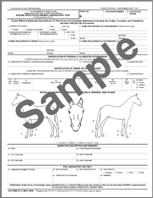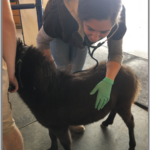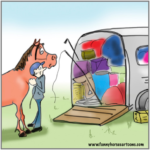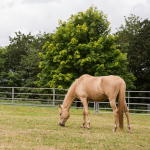Travelling With Your Horse to Another State?

Plan ahead
In the last year the requirements to travel with your horses around the Northwest have changed. Previously an agreement existed between Washington, Oregon, and Idaho that exempted horses from needing a Coggins test to travel between the states. After several horses were found to be positive for Equine Infectious Anemia, the disease Coggins tests for, the states collectively revoked this exemption. Now in order to travel with your horses there’s a few things you need to have on hand.
Equine Infectious Anemia (EIA)
EIA is a viral disease that affects any equine species (horses, donkeys, mules, and zebras). EIA is naturally transmitted from the blood of an infected horse to another horse by large biting flies. One-fifth of a teaspoon of blood from one horse infected with the virus is enough to infect at least 10,000 more horses. After infection some horses may have very mild signs that go unnoticed while other horses can have a severe or even fatal disease. In the initial stages of the disease the only signs may be a fever. If a horse survives the initial stages they may develop a chronic form. Signs can include a sudden high fever (often 104֯ F or above), depression, poor appetite, edema or swelling under the chest and lower legs, and anemia. The majority of horses infected with EIA will never show any of these signs but will become carriers of the disease and are able to transmit it to other horses, making recognition and control of the disease difficult. Once a horse is infected with EIA it is assumed to be infected for life and there is no effective treatment.
Coggins

EIA Form
Diagnosis of EIA was not possible until the Coggins test was developed in 1970. The Coggins test uses blood to test for antibodies to EIA. If antibodies are detected the horse is considered infected with EIA and has a positive Coggins. If an animal comes up positive for EIA they are often humanely euthanized or may be quarantined from any other equids for life depending on state guidelines. Although EIA is considered a rare disease, at least 15 cases were reported in 2015-2016 in Washington, Oregon, and Idaho. This resurgence in cases caused these states to once again require a Coggins test before entering a different state.
Health Certificate/Certificate of Veterinary Inspection

Health Exam
In addition to a Coggins test all horses travelling between states are also required to have a Certificate of Veterinary Inspection (CVI, often called health certificate). This is issued by your veterinarian after they perform a basic exam to ensure your animal is healthy enough to travel and is not carrying an infectious disease. This certificate must be issued within 30 days before traveling. There is also a Six-Month Equine Certificate, frequently known as a horse passport, that allows a health exam to be valid for 6 months between the states of Washington, Oregon, Idaho, California, and Montana (although a lifetime brand certificate must accompany the passport for Montana as well as a pre-authorization). During those 6 months it is important to track and record every trip out of state on the back of the passport. At the end of the 6 months a copy must be sent to each state you visited. If the states do not receive enough of these back the 6 month passport program may be discontinued.
Preparing to Travel
Before heading out on your next horse adventure in a neighboring state we advise contacting your veterinarian to find out the requirements to the state you will be travelling to. These rules often differ between states and may change frequently. Currently, in order to bring a horse int

o Oregon your horse must have a negative Coggins test within the last 6 months in addition to a C
VI. A foal under 6 months of age is exempt if they are travelling with their negative Coggins tested
dam. A negative Coggins test is valid in most states for 6-12 months and a health certificate varies between 2 weeks-6 months. You should plan to schedule an appointment with your veterinarian for a health exam and the blood draw for a Coggins test at least 1-2 weeks before you will travel.
What Happens with no Coggins or CVI?
If you choose to travel with your horse or other animal without the necessary requirements you may face a variety of consequences. You may be stopped at a checkpoint entering a state or at any time in the state by law enforcement. If your animal is found not to have the proper paperwork and permits you may face a fine and/or your animal may be confiscated and quarantined for weeks and additional disease testing may be performed at your cost. In Washington, for example, a fine alone may be from $225 up to $2,000 per horse!
What About Other Species?
Transporting any cattle, sheep, goats, pigs, camelids, etc between states has their own set of requirements. At the minimum all species need a certificate of veterinary inspection to travel to a different state. Depending on the species, age, gender, and state there may also be requirements for additional disease screening tests and animal identification. Please contact your veterinarian several weeks before you plan to ship one of these animals to ensure the proper requirements can be met in time to travel.
Whether showing, moving or camping, it is important to be prepared to travel with your horses. Health-related travel regulations are intended to help control and decrease the spread of infectious disease among horses and other species. Make sure your horses or other animals have the proper paperwork when traveling and do your part in protecting the health of your own horses and those in the places you visit!
